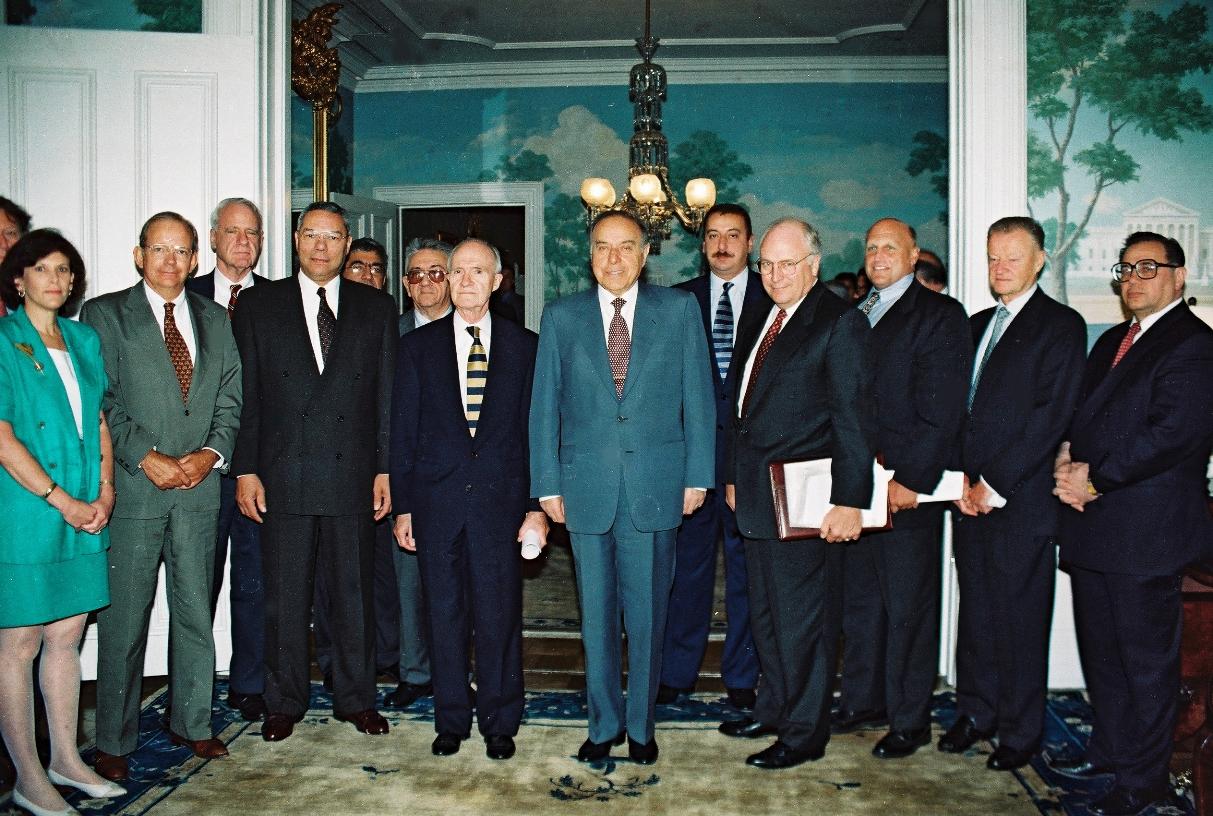
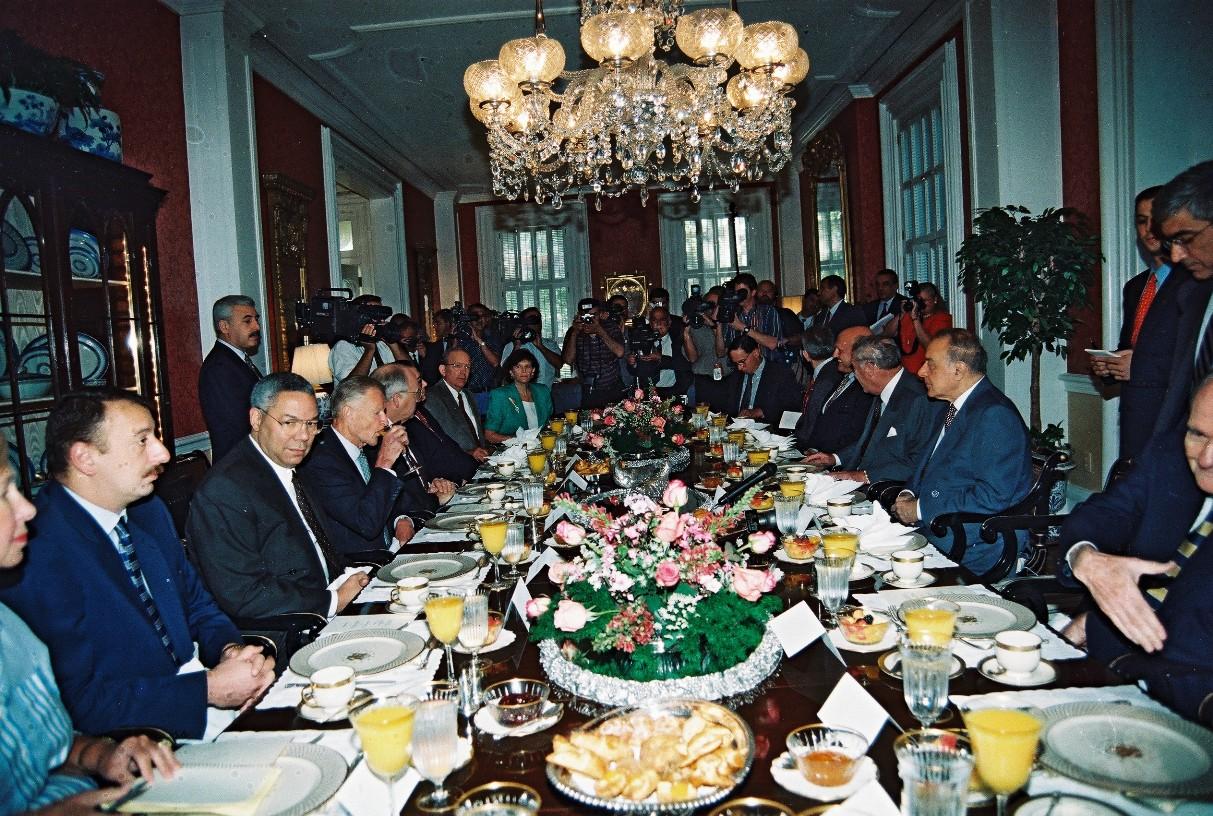
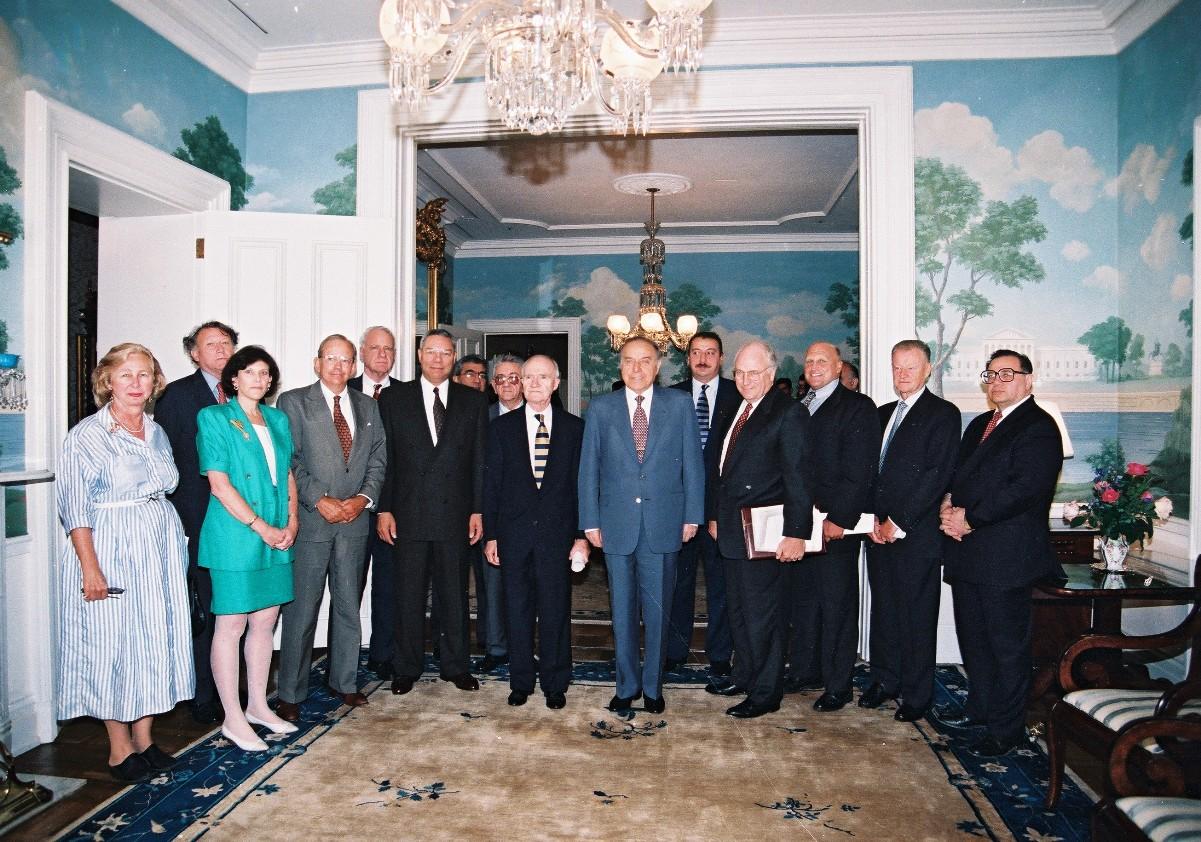
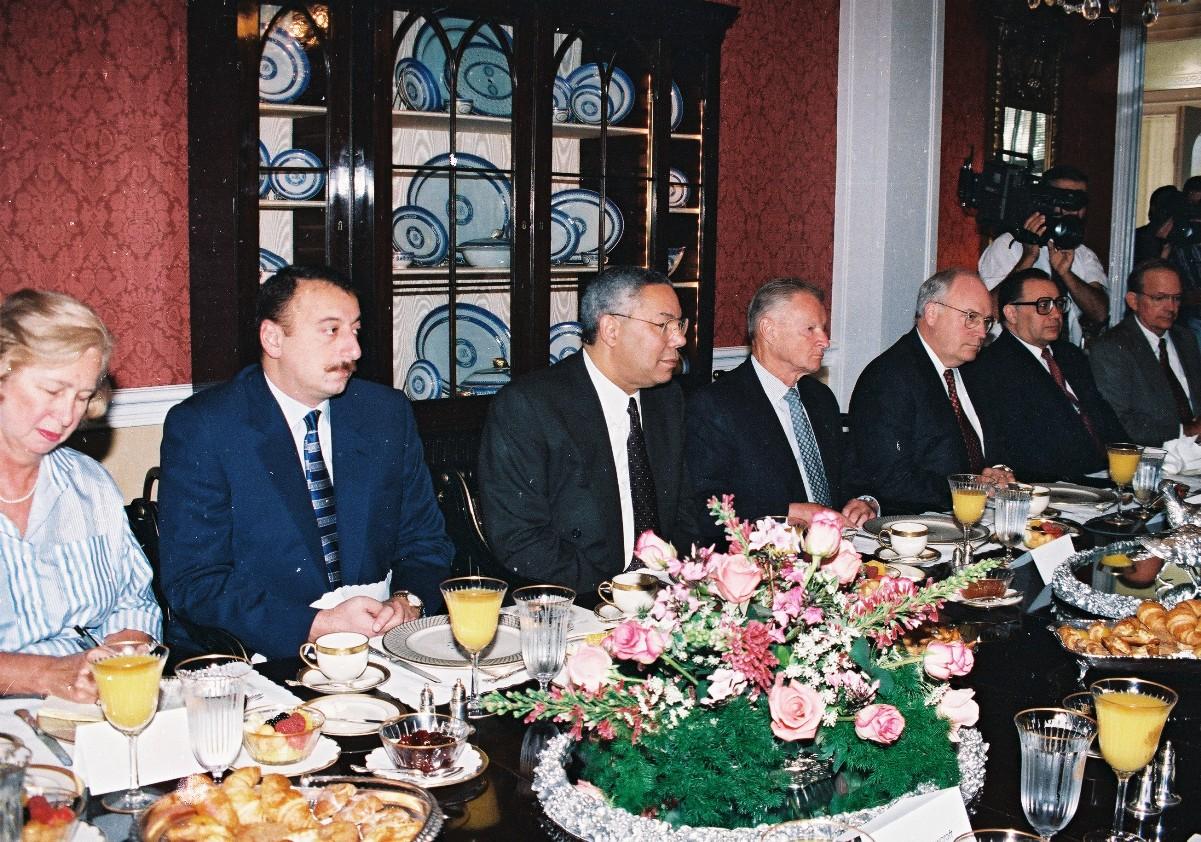
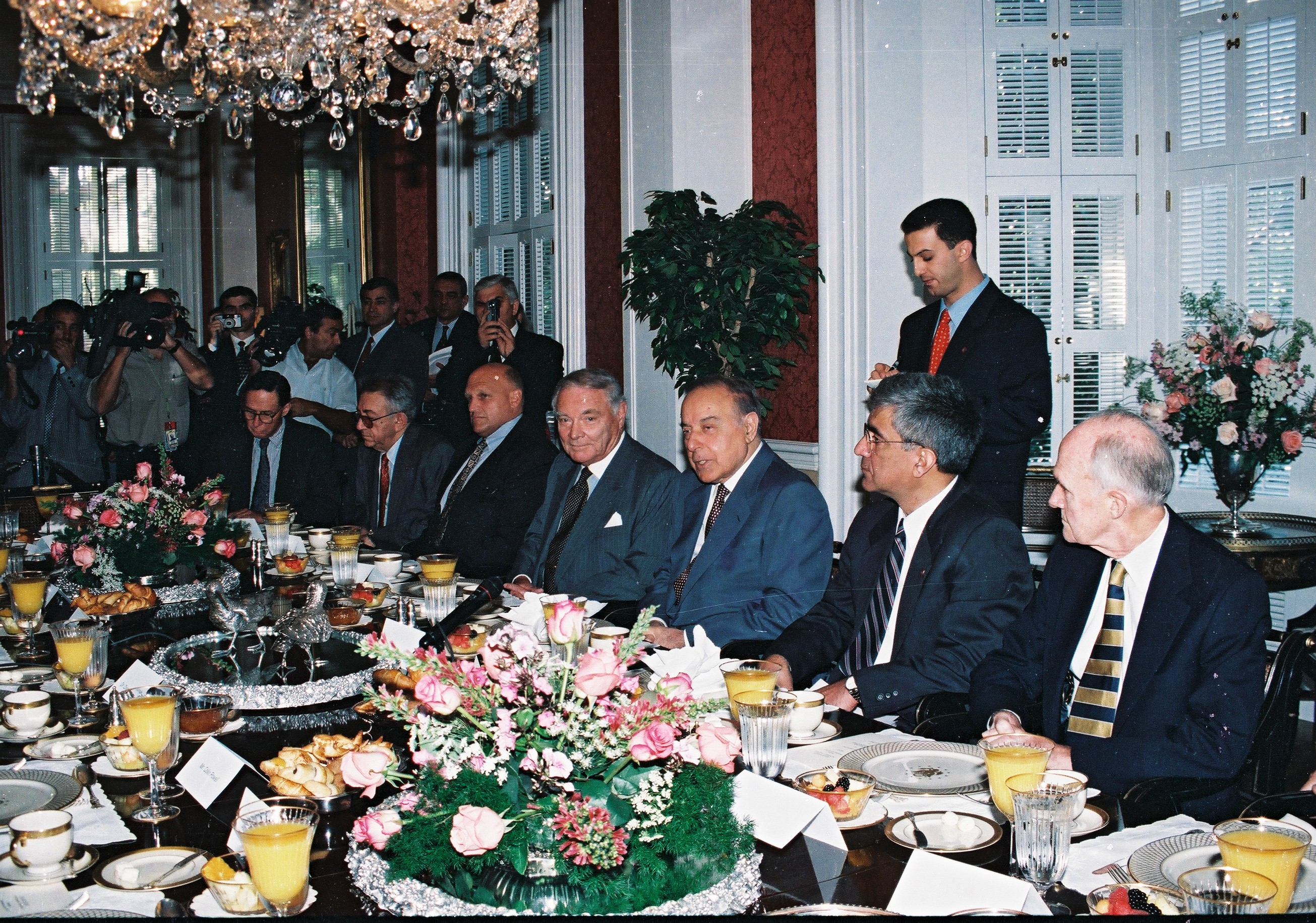
Esteemed friends!
I am very happy to have this meeting with you. Each of you is a famous and influential political and state figure. During the Soviet years your names always appeared in newspapers or on TV. After the collapse of the USSR, the interest in your names and your work has not been lost. The reason for this is that you are the people who participated in the process of disintegration of the Soviet Union. However, there are some groups who want to revive the Soviet Union. That`s why they have not forgotten you. I suppose that you have not forgotten them either.
I am very pleased to meet and welcome you from the bottom of my heart. As you know, I arrived in Washington yesterday. My meeting with you is one of my first meetings in Washington.
I am thoroughly familiar with your names. I am aware that you have played an important role in shaping the public opinion about the political and public administration of the United States, formation of the policies of and the government in the past as well as today. I had a wonderful opportunity to meet you personally some of you. However, there are also persons whom I have not met personally well, but know from books and media. Your photos have frequently appeared on TV, newspapers and books.
As you know, this is my first official visit to the United States as President of Azerbaijan. I attach an utmost importance to this visit and cherish great hopes in it.
As an independent state, Azerbaijan needs close cooperation with the United States in order to defend its freedom, build a legal, democratic and secular state. I shall do my best to strengthen the USA-Azerbaijani relations during this visit. I know that each of you is a person who has been defending the national interests of the United States. Therefore, meeting, discussing different issues with you and getting your advice is of great importance for me.
The USA-Azerbaijani relations are developing successfully. I think that our successes in building our relations are very positive. We are laying the foundation of friendship between our two nations. However, we still have a lot of problems in this sphera. Our economic relations are developing speedily. However, Azerbaijan needs assistance in solving a number of problems so that we can guarantee the US economic interests in Azerbaijan.
The most important issues for Azerbaijan are the peaceful settlement of the Armenian-Azerbaijani conflict and repeal of Section 907 passed by the US Congress against Azerbaijan.
I believe that you are well aware of the strategic importance of Azerbaijan in the Caucasus. Thus, your assistance in the solution of this problem is very crucial.
We may also touch upon other subjects during our discussions. I am ready to talk to you on this topic.
Zbigniew Brzesinski: “Mr. President, thank you. The objective of this meeting is to acquaint you with the views of the people who make the foreign policy of the United States.
Our objective today is to convey the thoughts of those people who develop the policy of the USA in your region. In order to organize our meeting fruitfully, I would invite all the participants to express their views on the attitude of the USA to your region. They may ask questions if they wish.”
Question: “If my memory serves me right, I met President Aliyev two years ago in Ashgabad. It seemed to me that there were similar sentiments and tendencies in the American foreign policy. I am glad that the US foreign policy has gone through a number of substantial changes. The position of the USA aimed at allowing Russia to dominate in the Caspian region has somewhat weakened. I think that now the Americans begin to realize that the Caspian Sea belongs to all the littoral countries.
I believe that both the US administration and people are strong supporters of the independence of the former Soviet republics. In this regard, we are for non-interference of Russia in the domestic affairs of the countries located in this region.
In conclusion, I would like to express my hope that you will achieve a breakthrough in your negotiations on the disputed areas. Unfortunately, we have not witnessed any progress in this direction for the last several months. Mr. President, we would like to hear your position on these matters.
Answer: I will respond to this question as it is an excellent question. First, I should note that our position on not permitting Russian to dominate in the Caspian basin completely coincides with yours. This is the main direction of our policy.
As you know, Russia ruled in the Caspian Sea for centuries. Under the soviets, the Caspian Sea belonged to the Soviet Union entirely. Iran controlled a small part of the Caspian in the south. The Soviet Union and Iran demarcated their borders from Hesenqulu to Astara. Hesenqulu is in Turkmenistan, and Astara belonged to Azerbaijan. This line marked the frontier. During that period the Soviet Union was producing oil in the Caspian Sea, and Azerbaijan was the only producer of this oil.
As you know, Azerbaijan was the first to begin deep-water oil exploration in the Caspian Sea some 50 years ago in 1947. This was a great achievement for our scientists and oilmen. However, in 1970 when Azerbaijan was already producing oil in different parts of the Caspian, the Soviet authorities started to divide the Caspian into various sectors. In 1970, the Soviet authorities issued a special decree in this regard.
I would like you to know that despite the fact that the Azerbaijani oil enterprises and facilities were producing this oil alone, the oil extracted in different sectors was to the account of other republics as the Caspian was divided into sectors. When our country gained its independence, we started to attract foreign oil capital to operate these oil deposits. In September 1994, we signed the first major oil contract named "The Contract of the Century" in the United States. We created a consortium to implement this contract. The American companies are leading that consortium. AMOCO, Pennzoil, Unocal, McDermott, Exxon, Great Britain`s British Petroleum, Norwegian Statoil are all part of this consortium. After the signature of this contract, the question of the legal status of the Caspian Sea was raised. We accepted the suggestion to discuss the issue, however the positions on this matter diverged. In order to rule the Caspian against Russia since it is the most powerful of all the Caspian states, we proposed the idea of a "condominium" which means that an area up to 12 miles should be controlled by the respective states, and the rest of the sea should belong to all the countries.
We rely on the principle used since 1970, division of the Caspian Sea into sectors for developing the mineral resources.
Iran immediately accepted the Russian proposal, as did Turkmenistan. Azerbaijan insisted on its own principles, and Kazakhstan later joined the idea of dividing the Caspian into the sectors. Therefore, two out of the five Caspian states supported the sectoral division, and three prefer the "condominium" division. I suppose that there is no need to explain that the Russian proposal is accepted, Russia will gain complete domination over the Caspian. That`s why we need your assistance in this question.
We give preference to the principle of division of the Caspian into sectors. The Caspian Sea is an unusual water basin. However, there are similar lakes and water basins in the world. In the case of such similar basins, there is a precedence of dividing the water basin into sectors or designating portions of the basin according to the borders of the respective countries. This is our position, and it is irreversible.
As far as the dispute you mentioned, Mr. Hague, I know that you are a big friend of Turkmenistan, and a friend of my friend Turkmenbashi. I wish that you could explain some things to our friend Turkmenbashi when you advise him. We signed the contracts in 1994, and Turkmenbashi did not raise any question then. Only 10 to 15 days ago, he suddenly claimed that two oil deposits belonging to Azerbaijan also belong to Turkmenistan. First, his allegation is groundless. Second, if he rejects the idea of sectoral division, then how could he claim anything of this sort based on the division of the sea?
A few days before departing for the United States, I phoned Mr. Turkmenbashi and informed him that if there were any unclear issues, then our delegations could meet and discuss them. There is no need to exaggerate the issue since such an argument would only help the Russian plans of "divide and conquer." The maps I handed out clearly expound the division principle.”
Question: “Mr. President, following on that issue, I would like to note that the Azerbaijani Republic and Azerbaijan International Operating Company have established very productive relations. The disputable issue with Turkmenistan was also touched on today. You have invited the Russian Lukoil, and I think, Transneft companies to join the projects on these disputed deposits. Could you explain your strategy in drawing the Russian companies to these particular sites?”
Answer: “You may want to know that the companies from the US, Great Britain, France, Germany, Japan, Belgium, Turkey, Iran, Italy, and Saudi Arabia participate in these contracts. I enumerated ten countries. All these countries are located far from the Caspian Sea. But Russia is a part of the Caspian basin. Under such circumstances, it is quite natural to award a small portion of these deposits to the Russian Lukoil. First, it has a commercial importance. Secondly, in order to carry out heavy work in the Caspian, one needs to utilize the Volga-Don canal. It is impossible to isolate Russia in that regard.”
Question: “Mr. President, undoubtedly, all of us who want a strong and independent Azerbaijan, clearly realize the significance of the development of the Azerbaijani oil deposits.
One of the factors that would indicate the success of the capital invested in Azerbaijan would be the safe and uninterrupted export of the Azerbaijani oil to the world markets. What can you say about the pipeline plans, and the conflicts they cause? In general, what can you say about the export of the Azerbaijani oil, pipeline routes? In what direction will the main pipeline lie?
Answer: “As you know, right after the signature of the contract in 1994, Russia began to exert considerable pressure on us. Unfortunately, both Armenia and Iran joined Russia. They thought that although we had signed the contracts, they would prevent us from exporting the oil. Russia is convinced that all the oil extracted in the Caspian must be transported through the Russian territory. Recently when your Energy Secretary was in Moscow and meet the first deputy prime minister Nemtsov, we learned that Nemtsov informed your Energy Secretary that you, the Americans, could produce as much oil in the Caspian as you like. However, all of it must be exported through the Russian territory. In other words, even though they failed to block us from the signature the contract, they now want to obstacle the export of our energy resources. The US administration and especially President Clinton are well aware of this situation.
Thus, we have a decided to lay two pipelines to transport the oil to the world markets. President Clinton repeatedly asked me to do so. One of the pipelines will cross the Russian territory to the Black Sea port of Novorossiysk, and the other will go through Georgia and reach Supsa port on the Black Sea. These pipelines are for transporting the first bulk of the oil. But we are waiting for the major part of the oil. The question is in what direction can we export not only the Azerbaijani oil, but also the Kazakh oil. We support the pipelines that will lie through Georgia to the Mediterranean port of Ceyhan in Turkey. Russia and Iran want the pipelines to be built through their territories. Some experts deem the Iranian route commercially more viable. Russia has already faced serious difficulties in the transportation of the early oil. The Chechens objected to the transportation of the oil through their territory where the length of the pipeline is 100 km. The Russian leaders appealed to me. The Chechen President Asian Maskhadov arrived in Baku to meet me. Then Nemtsov, the first deputy prime minister of Russia, came to Baku. We signed a tripartite agreement among Russia, Azerbaijan and Chechnya.
We also have an agreement with Kazakhstan. We already transport the oil produced by Chevron in Tengiz oil deposits via the Caspian Sea to Baku, then to the Georgian ports on the Black Sea. We carry out this operation using tankers and the railway. On the other hand, Nazarbayev and I signed a document last June to initiate the construction of a sub-water pipeline from Kazakhstan to Baku. Therefore, all the oil produced in the Caspian basin will be exported to the world markets via Azerbaijan. This route is very lucrative and convenient for the United States and the West.”
Question: “In late 1995, President Clinton and Anthony Lake asked me to travel to your region to inform you of the two-pipeline position of the United States. I wonder whether Mr. Lake has anything to say regarding the position of the USA administration in this issue.
Anthony lake: “It is clear that our strategic approach is close to the position you have just described. I think that even the Russians have clearly realized our stance in this regard. I can personally attest to the fact that, during 1993 to 1995 when I was part of a negotiating team, our positions were made amply clear to the Russians. Although I am certain that everyone sitting at this table comprehends the benefits of this issue from both strategic and economic viewpoints, it is still not fully realized by Washington. That`s why I think that your visit to Washington will also contribute to clarifying this issue.
Question: “If I could, I would like to go back to Mr. Hague`s question. It is the question of Nagorno-Karabakh, which is connected with the issue of pipelines. I would like to know if there is a possibility of any compromise in the settlement of the conflict? I would like to ask you to express your opinion concerning this issue.
Answer: “Thank you very much. This is an important question for me. As I told you, my main objective in coming to the US is to seek more support of the United States in the resolution of the Nagorno-Karabakh conflict. You can see from the maps handed out that 20% of our lands, including Nagorno-Karabakh, have been occupied by the Armenian armed forces. We signed a cease-fire agreement three years ago, and there has been no fighting since then.
Finally, during the last OSCE Summit in Lisbon, three principals were developed for the settlement of the conflict. First, the territorial integrity of Azerbaijan and Armenia must be recognized. Second, Nagorno-Karabakh will be given a high-autonomy status within Azerbaijan. Third, the security of the entire population of Nagorno-Karabakh will be guaranteed. Although these principles did not completely satisfy us, we still voted in their favor. There, 53 out 54 member-countries of OSCE, including the United States supported these principles. Armenia opposed them.
As you know, the United States, Russia and France are co-chairs in the Minsk Group of OSCE. The presidents of these countries - Bill Clinton, Jacques Chirac and Boris Yeltsin - issued a joint statement on June 20th in Denver calling for a peaceful solution to the conflict. Mr. Strobe Talbott is an American co-chair. Three co-chairs submitted proposals to us lately, and they consisted of two components. In the first stage, the Armenian armed forces have to withdraw from six districts bordering Nagorno-Karabakh, thus returning our refugees to the liberated areas.
I would like to explain something on this map. The territory of Nagorno-Karabakh is in red. Six Azerbaijani districts neighboring Nagorno-Karabakh are colored in green. The Azerbaijani district of Lachin, which was entirely populated by Azerbaijanis and now under the Armenian occupation is in yellow. You can also see the town of Shusha inside Nagorno-Karabakh, but with the Azerbaijanis in majority. This town is the cultural center for Azerbaijan. All these lands constitute 20% of the Azerbaijani territory and are occupied by the Armenian armed forces. One million Azeri citizens have been ousted from these lands and now live in tent camps throughout Azerbaijan. Mr. Brzezinski has seen those tents. Based on the latest proposals of the Minsk Group, we demand the implementation of the first phase of the plan, which is liberating the territories colored in green and returning theentire population. At the second stage while we discuss the status of Nagorno-Karabakh, we demand the liberation of the Azerbaijani lands, which are in yellow on the map. You know that one million refugees have been living in tents for five years now. One million people out of seven are refugees.
I would also like to inform you that Russia promised to settle the issue if they were allowed to deploy their troops in our country. However, we have not permitted the Russian bases to be stationed in Azerbaijan. There are no Russian troops or military bases in the Azerbaijani territory.
Armenia houses large Russian armies and a military base. Russia and Armenia also have a military pact. Russia is guarding the Armenian borders with Turkey and Iran. Georgia is also in the same situation. However, we are the only state in the Caucasus which has no Russian soldier on its soil.
Under such difficult conditions, the Russians repeatedly suggested to allow them to deploy their forces in Azerbaijan and then they will liberate our lands. But we refused this offer. That`s why it is critical that an OSCE multi-national peacekeeping force be formed and dispatched to the region in order to secure the withdrawal of the Armenian troops from the occupied lands.
Question: “Mr. President, I would like to ask a question regarding your personal ideology. You have had a stunning political career. You were a member of the Politburo of the Communist Party, and today you are the leader of your country. How did this change in your personal philosophy happen?”
Answer: “It may seem strange to you, however, on the other hand it is quite natural. My activities at that time are one phase of my life. The period beginning in the late 1980s, after I resigned from the Politburo in 1987, became the second stage of my life. I have a book I will give to you, and you will see how a Communist became an anti-Communist. Let me be brief.
Because of a number of differences in opinions, I resigned from the Politburo in 1987. In 1988, Armenia launched an aggressive attack against Azerbaijan, and the war broke out. I protested. But the leaders of the Communist Party - Gorbachev and others - did nothing to stop the bloodshed.
In 1990 by the order of the Communist party, large detachments of the Soviet Army invaded Baku and massacred the Azerbaijani people. They attempted to suppress the national liberation movement. I resided in Moscow at that time. During the meetings and demonstrations in Moscow, I protested against the actions of the Soviet Union and left the ranks of the Communist party. They began persecuting me for that action. Instead, I waged a struggle aimed at the destruction of the Soviet Union. They wanted to arrest me in Moscow, so I returned to Azerbaijan. The Communist regime was still in power in Azerbaijan. I was not allowed to stay in Baku, and I had to leave for my native Nakhichevan, which was under the Armenian blockade. I lived three years there under hard exile conditions. I made the first steps toward a democratic future for Azerbaijan while I was in Nakhichevan. Since I was respected in Azerbaijan, my speeches on the necessity of the collapse of the Soviet Union and Communist Party sounded convincing to people. Since then I have desired a free, independent and democratic Azerbaijan.
In 1993 when there was a threat of a civil war, the people demanded my return to Baku, which I did. I have been involved in the process of building a democratic, legal and secular society in Azerbaijan since then. The work which I carried out during this period proves my point.
It is an intractable task to preserve full independence with 20% of our lands under the Armenian occupation. One million citizens are refugees who live in tents. We are good friends with our Georgian and Turkish neighbors. But we have very strong enemies too. Under such conditions, I strive to keep our independence and build democracy. We have political pluralism in our country. People can express their opinions as they wish. We have freedom of expression, with more than 30 political parties. Eight parties are represented in the Parliament.”
Question: “Mr. President, with your permission, let`s look into future. I think that after NATO`s decision to expand towards the East, the Russian plans will include the formulation of policies towards the former Soviet lands. That means Russia will either attempt to make those countries economically interdependent or undermine political independence. Mr. President, if you were the national security advisor to the future president of the United States, what would be your advice to the president on how to deal with Russia regarding the former Soviet countries?”
Answer: I would have provided him with good advice. I ask you to appoint me to that post. (Laughs). I will help since I know Russia very well. The situation of Azerbaijan is especially difficult. Russia considers Armenia its greatest ally in the region. How many Russian troops can be stationed on a small territory of only 29,000 square kilometers? It has recently been discovered that the Russian Defense Ministry has been illegally and secretly supplying Armenia with modern weaponry for the last three years. We directed our questions to Boris Yeltsin. We have the list of missiles and tanks that were transferred to Armenia. There were even missiles with nuclear warheads. These weapons can destroy not only Azerbaijan, but also everything around it. We have handed out another map to you. This map indicates the radius that the Russian missiles deployed in Armenia can reach. Therefore, if I were the National Security Advisor to the U.S. President, I would have advised him to pay more serious attention to the situation. We are a part of CIS, however, we have our own independent position. Because of this independent stance, we are not much liked in CIS.
Question: “When you raised this question before Mr. Yeltsin, what was his reaction? Since Russia is a co-chair in the resolution of Karabakh problem, what is your attitude to these actions?”
Answer: “This is really paradoxical. What can I do now? We are a small nation with 20% of its lands under occupation. When I was in Moscow last March at the summit of CIS countries, I asked, "Why does Russia keep a military base in Armenia? Who needs this, and who is it aimed against? Is it possible that two member-states of CIS had such a special military agreement between them?" I told Yeltsin that all the weaponry transferred from Russia to Armenia must be returned, and the guilty party must be punished. He ordered an investigation into the matter, and the investigation is in process. But we know everything since we have all the documents. Parts of these documents were published in the press. During my meeting with Yeltsin last June, he promised me again that he would take appropriate measures. I am waiting. Now Yeltsin is on vacation. We shall see what will happen after he returns.
You are asking me questions, and I would like to ask you a question as well. Under such circumstances, U.S. Congress passed an unjust law against Azerbaijan in 1992. President Clinton stated in his conversation with me that he was against Section 907. Secretary of State Albright also spoke in favor of repealing this law. In the past, Mr. Bush was opposed to it as well. A few days ago, Congressman King submitted a draft to the Congress urging the repeal of this law.
This is too paradoxical. Armenia has occupied our lands and forced our people out of their homes. Nevertheless, we are accused of blockading Armenia and thus are deprived of the US assistance. America provides $100 million, $250-300 million a year to Armenia, but we get nothing. The American companies signed long-term, 30, 40, 50-year contracts with Azerbaijan, and the United States will greatly benefit from these relations. In these conditions the United States discriminates against Azerbaijan. I will speak on it today at the Congress. I have repeatedly talked to Dr. Brzezinski about these issues. I urge you to eliminate this injustice.
The greatest advantage of the United States is its just approach to the issues. However, such an unfair action of the U.S. Congress doesn`t coincide with the positive image of America. When we bring up these matters, we are frequently told that the decision was made under the pressure of the Armenian Diaspora and lobby. Sometimes I wonder if the Armenian lobby is stronger than the government of the United States. I do not want to think so. I am told that there are one million Armenians residing in America. The population of the U.S. is about 300 million. If only one million Armenians could do such tricks to you, then it won`t take long before another Armenian state is created in America. You should prevent this threat.
You may remember that when I met you in Baku, I stated that we wanted real peace. Azerbaijan and Armenia will remain to be neighbors just like they have been for many centuries in the past. That`s why there should be no animosity, conflict or hostilities. We genuinely want peace with Armenia, so that our previous good relationships are restored. When I say about the autonomy for Nagorno-Karabakh within Azerbaijan, I would like to assure you that I really mean broad autonomy for that region. I know that there is only one way - peace, and we are pursuing this avenue.
Thank you. I am very pleased meeting you. I invite all of you to Azerbaijan. I would ask you to visit Azerbaijan. Dr. Brzezinski has been in Azerbaijan and can tell you about it. Mr. Scowcroft has also visited our country. But I am inviting each of you to Azerbaijan again. I sincerely wish that you establish friendly relations with Azerbaijan and me personally. Thank you very much.”
The document was taken from the edition of “Together Towards The New Century”